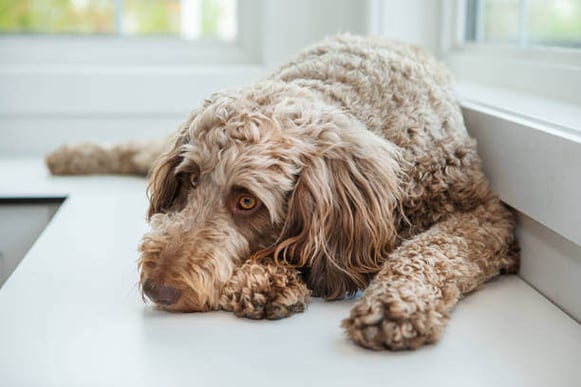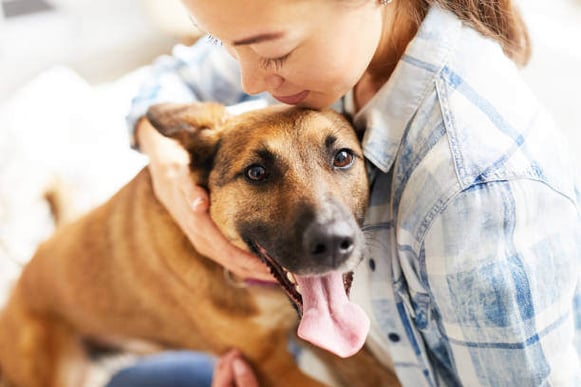Whether you're a pet parent or pet-care business, you've likely witnessed canine anxiety.
Anxiety in dogs is a common issue that many pet parents face. Just like humans, dogs can experience anxiety for various reasons, including environmental, medical, or even breed-related factors. The severity of a pet's anxiety varies as well, from panting to serious aggression. Anxiety isn't something to ignore, but it isn't something to necessarily break a sweat over, either.
Today we will walk you through the signs, causes, and treatment methods of canine anxiety. This knowledge will equip you to notice and address future patterns of anxiety, ensuring the well-being of your pets and those you may care for. Let's dive in!
Warning Signs
 Recognizing anxiety in dogs is the first step toward helping them. Dogs may exhibit various behaviors when they're anxious, including:
Recognizing anxiety in dogs is the first step toward helping them. Dogs may exhibit various behaviors when they're anxious, including:
- Excessive Barking or Whining: Dogs often vocalize their anxiety through persistent barking or whining, especially when left alone or exposed to stressful situations.
- Pacing or Restlessness: An anxious dog might pace back and forth or seem unable to settle down.
- Destructive Behavior: Chewing, digging, or other destructive activities can be a sign that your dog is trying to cope with their anxiety.
- Panting and Drooling: An anxious dog may pant excessively or drool more than usual, even when not hot or thirsty.
- Aggression: Anxiety can sometimes manifest as aggression towards other animals or people.
- Avoidance or Withdrawal: An anxious dog may try to hide or withdraw from people and activities they usually enjoy.
- Changes in Appetite: Anxiety can lead to a loss of appetite or, conversely, overeating.
Causes and Treatment
 The causes of anxiety in dogs can vary widely. One of the most common triggers is separation anxiety, which occurs when dogs are left alone. Loud noises such as thunderstorms and fireworks are another frequent cause, leading many dogs to tremble or hide. Past trauma, such as abuse or neglect, can also contribute to anxiety, especially in rescue dogs.
The causes of anxiety in dogs can vary widely. One of the most common triggers is separation anxiety, which occurs when dogs are left alone. Loud noises such as thunderstorms and fireworks are another frequent cause, leading many dogs to tremble or hide. Past trauma, such as abuse or neglect, can also contribute to anxiety, especially in rescue dogs.
Lack of proper socialization can make dogs anxious in new situations, and changes in environment or routine—like moving to a new home—can also be significant stressors. Additionally, anxiety may sometimes stem from underlying medical issues, such as pain or illness.
Once you’ve identified the signs and potential causes of your dog’s anxiety, there are several treatment options to consider:
- Behavioral Training: Techniques like desensitization and counter-conditioning can help your dog become more comfortable with their anxiety triggers. Consistent training and positive reinforcement are key components of reducing anxiety.
- Exercise and Mental Stimulation: Regular physical activity and mental enrichment are crucial for reducing anxiety. Activities like puzzle toys, interactive games, and obedience training can burn off excess energy and keep your dog’s mind occupied.
- Comforting Environment: Creating a safe and comforting space for your dog is essential. This might include providing a cozy bed, favorite toys, or even a piece of your clothing with your scent. Some dogs feel more secure in a crate when viewed as a safe haven rather than confinement.
In addition to these strategies, some dogs may benefit from natural remedies like CBD oil, calming supplements, or pheromone diffusers, which can help create a sense of calm. In more severe cases, your veterinarian might recommend anti-anxiety medications to be used in conjunction with behavioral training.
If anxiety persists or is particularly severe, consulting a professional dog trainer or behaviorist may be necessary to develop a tailored plan to help your dog overcome their anxiety.
 Anxiety in dogs is a common but sometimes complex issue. But with patience, understanding, and the right approach, you can help your dog feel more secure and content.
Anxiety in dogs is a common but sometimes complex issue. But with patience, understanding, and the right approach, you can help your dog feel more secure and content.
At Gingr, we understand that pet-care businesses interact daily with dogs of different ages, breeds, and behaviors. Our intuitive software makes it easy to identify and organize dogs so your business can avoid potential issues and keep pet parents happy.
Experience a better way to manage your pet-care business. Book a Gingr demo today!


